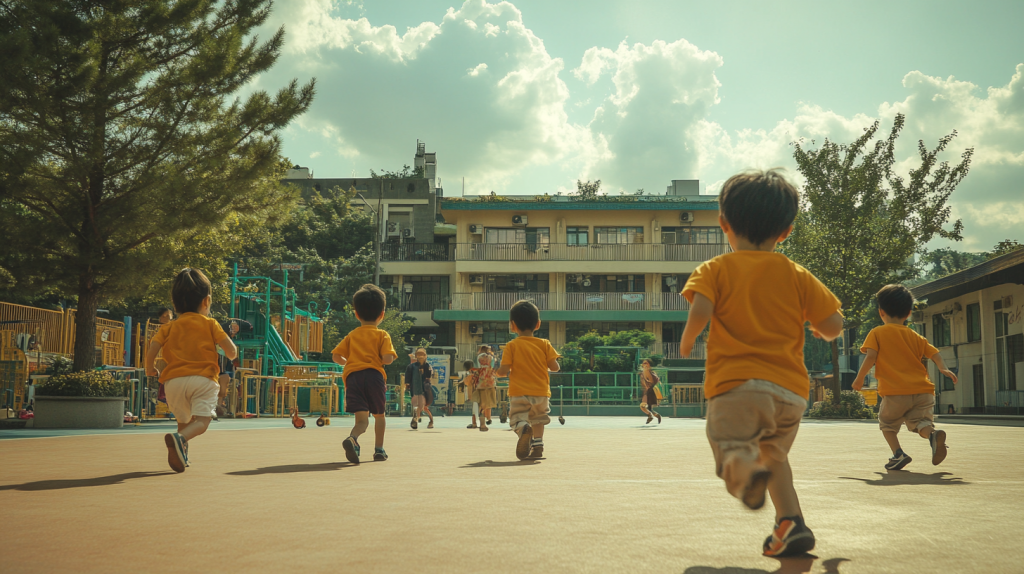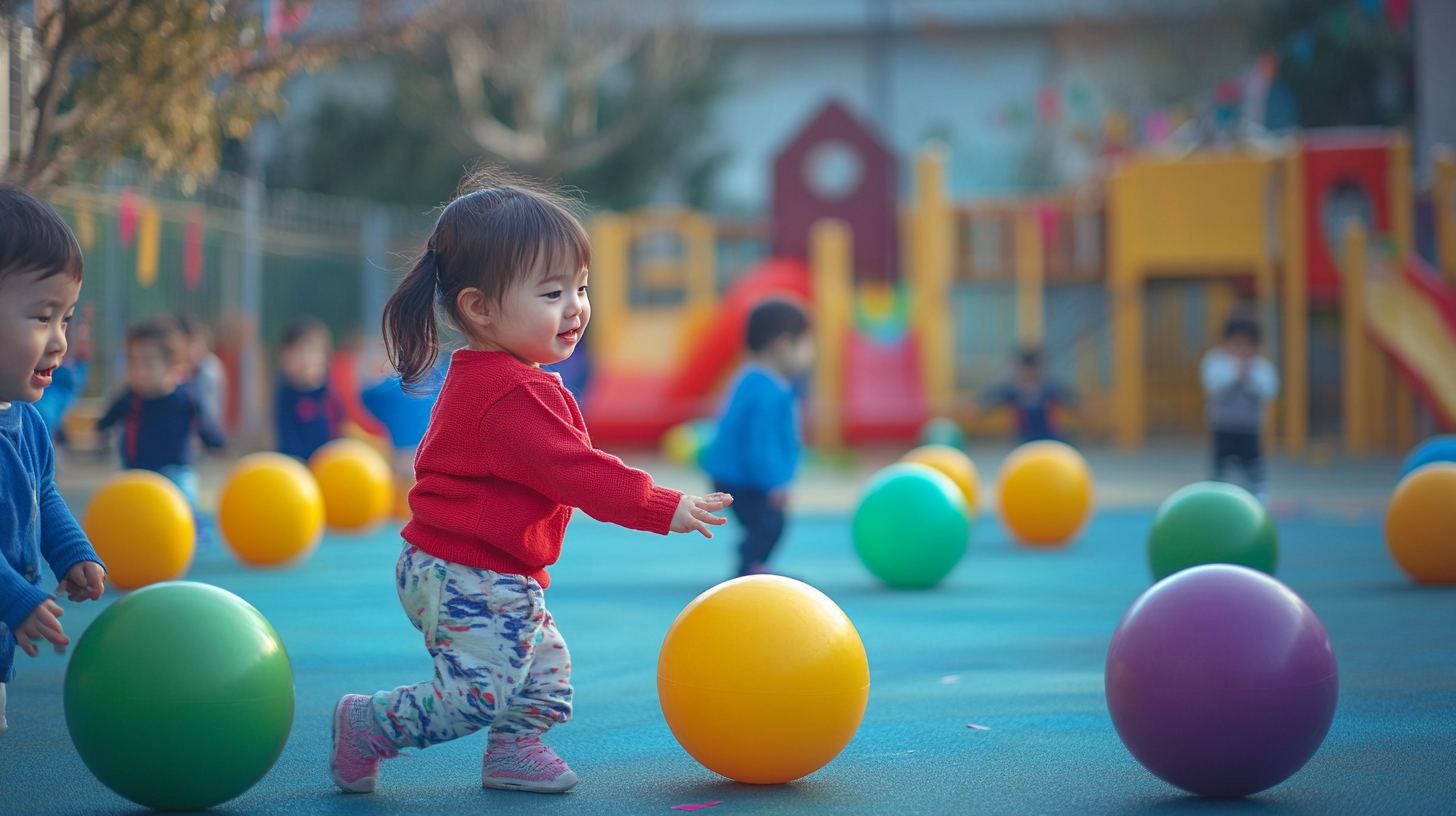For parents, watching a child grow is an incredible journey, filled with small victories and significant milestones. From the first steps to the first words, each stage is a testament to their incredible development. As they reach the preschool years, a new set of milestones comes into focus. These aren’t just about what they can say or do, but how they interact with the world around them.
This is where structured play, like preschool soccer, becomes a powerful tool. It’s about so much more than just kicking a ball. At Discovery Time Learning Center, we see firsthand how this simple activity becomes a fun, engaging way for preschoolers to tackle some of the most important developmental milestones.
Building a Foundation, One Kick at a Time
When you think of soccer, you might picture fast-paced games and impressive dribbling. But for preschoolers, it’s a completely different experience. Our approach focuses on the joy of movement and the fundamentals of play. We create a non-competitive environment where every child feels like a winner, regardless of their skill level. This focus on fun is the secret ingredient that unlocks a world of benefits.
Preschool soccer at our Alexandria center is designed to be a playful introduction to physical activity. It’s a chance for your little one to run, jump, and explore their own capabilities in a safe and supportive setting.

The Power of Gross Motor Skills
Gross motor skills are the foundation of physical coordination. They involve the large muscles in the arms, legs, and torso, and they are crucial for everyday activities. Think about how your child runs, jumps, or climbs. These are all gross motor skills at work. Preschool soccer is a fantastic way to develop and refine these abilities.
- Running and Changing Direction: A simple chase-the-ball game helps children practice starting, stopping, and changing direction quickly. This improves their agility and balance.
- Kicking and Coordination: Kicking a ball with their foot requires coordination between their eyes, legs, and body. It’s a complex task that strengthens their balance and improves spatial awareness.
- Jumping and Hopping: Coaches incorporate fun warm-ups and drills that encourage jumping and hopping. These movements are essential for building leg strength and overall body control.
- Balance and Stability: Standing on one leg, even for a moment, to kick a ball is a great way to improve balance. As they get more comfortable, their stability will improve, reducing the number of trips and falls.
Developing Fine Motor Skills Through Play
While soccer is primarily a gross motor activity, it also has a surprising impact on fine motor skills. These are the small, precise movements of the hands and fingers. While a child won’t be writing or drawing on the field, the activities still contribute to their development.
- Gripping a Ball: Using their hands to hold or carry the ball, or even just picking it up off the ground, works their hand-eye coordination and grip strength.
- Tossing and Catching: Simple passing games, even just with their hands, help them practice the coordination needed to grip and release objects with precision.
- Putting on Gear: The simple act of putting on shin guards or tying shoes (with help) strengthens the muscles in their hands and fingers, preparing them for more complex tasks in the future.
Beyond the Physical: The Social-Emotional Benefits
Physical development is only one piece of the puzzle. Preschool soccer is also a powerful engine for social and emotional growth. It’s often the first time a child is part of a team, and the lessons they learn here are invaluable for the rest of their lives.
- Sharing and Taking Turns: Soccer is a team sport, which means everyone gets a turn with the ball. This teaches children the importance of sharing and patience, which are critical social skills.
- Teamwork and Cooperation: Even at this young age, children learn to work together towards a common goal. They celebrate when a teammate scores and learn to support each other.
- Listening and Following Instructions: Coaches give simple, clear instructions, and children learn to listen carefully and follow directions. This helps build their focus and discipline.
- Managing Emotions: Not every kick goes as planned, and sometimes they fall down. This provides a safe space for children to learn how to manage frustration and bounce back from small setbacks with a positive attitude.
- Building Confidence: Successfully kicking the ball, making a new friend, or learning a new skill gives a child a huge boost of confidence. This feeling of accomplishment encourages them to try new things and take on new challenges.
Cognitive Growth on the Field
Preschool soccer isn’t just about physical activity; it’s also a great mental workout. The skills children learn on the field lay the groundwork for cognitive development.
- Problem-Solving: Deciding where to kick the ball or how to get it past a friend requires quick thinking and simple problem-solving skills.
- Cause and Effect: Children learn that kicking the ball causes it to move. This simple understanding of cause and effect is a fundamental cognitive concept.
- Memory and Sequencing: Remembering the order of a drill or a simple game requires memory and sequencing skills.
- Spatial Awareness: Understanding where they are on the field in relation to the ball, the goal, and other players is a key component of spatial awareness.

Why Non-Competitive Play Matters Most
At Discovery Time Learning Center, our philosophy is simple: fun first. We believe that for this age group, the focus should be on building a love for physical activity, not on winning or losing.
When the pressure to win is removed, children are free to explore, experiment, and make mistakes without fear. This creates a positive and supportive environment where they can build confidence and develop a lifelong passion for being active. Our coaches are trained to be patient, encouraging, and to celebrate every small success, no matter how minor it may seem.
Conclusion: Beyond the Game, A Brighter Future
Preschool is a time of incredible growth and discovery. By introducing children to a structured activity like soccer, we’re not just teaching them how to kick a ball. We’re giving them the tools they need to navigate the world with confidence and skill.
The lessons learned on the field, from teamwork and perseverance to coordination and emotional control, are the milestones that truly matter. They are the building blocks for a lifetime of success, both in and out of the classroom.
Ready to see your child tackle their next milestone? Discovery Time Learning Center offers comprehensive full-time, part-time, and drop-in daycare services in Alexandria, VA. Our enriching programs are designed to support your child’s holistic development in a fun, safe, and nurturing environment.
FAQs about Preschool Soccer
1. What is the right age for a child to start playing soccer?
The ideal age for a child to begin a non-competitive soccer program is typically between 3 and 5 years old. At this age, children have developed the basic gross motor skills needed to run and kick, and they are also beginning to grasp social concepts like sharing and following instructions. Programs for this age group, such as the one at Discovery Time Learning Center, focus on playful introduction to the sport rather than on formal rules or competition. The primary goal is to foster a love for physical activity and to help them achieve key developmental milestones in a fun and supportive environment.
2. Are preschool soccer programs too competitive for young children?
No, a well-structured preschool soccer program should be non-competitive. At Discovery Time Learning Center, our focus is entirely on fun, skill development, and social interaction. We do not keep score or emphasize winning. Instead, we use positive reinforcement to celebrate participation, effort, and teamwork. The games and drills are designed to be playful and engaging, helping children build confidence and a positive association with physical activity without the pressure of a competitive environment.
3. How does preschool soccer help with social skills?
Preschool soccer is an excellent way for children to develop crucial social skills. Being part of a team, even a very informal one, teaches them to cooperate and work together toward a common goal. They learn the importance of sharing the ball, taking turns, and being patient with others. They also get a chance to practice listening to a coach’s instructions and interacting with new friends. This structured group setting provides a safe and fun environment for children to build relationships and learn how to navigate social situations.
4. What physical benefits does a child get from playing preschool soccer?
Preschool soccer is a comprehensive physical workout for young children. It helps them develop and refine their gross motor skills, which are essential for everyday life. Key physical benefits include improved balance, coordination, and agility. The act of running, kicking, and stopping helps to strengthen their leg muscles and build stamina. It also contributes to better spatial awareness as they learn to navigate the field and understand where their body is in relation to the ball and other players.
5. What should my child wear for preschool soccer?
Comfortable athletic clothing is the best choice for preschool soccer. This can include shorts, sweatpants, or leggings, along with a t-shirt or sweatshirt. Athletic shoes, such as sneakers, are also recommended for good traction and support. While not always necessary for younger age groups, some programs may suggest shin guards for added protection. It’s also a good idea to bring a water bottle to keep them hydrated throughout the session.



